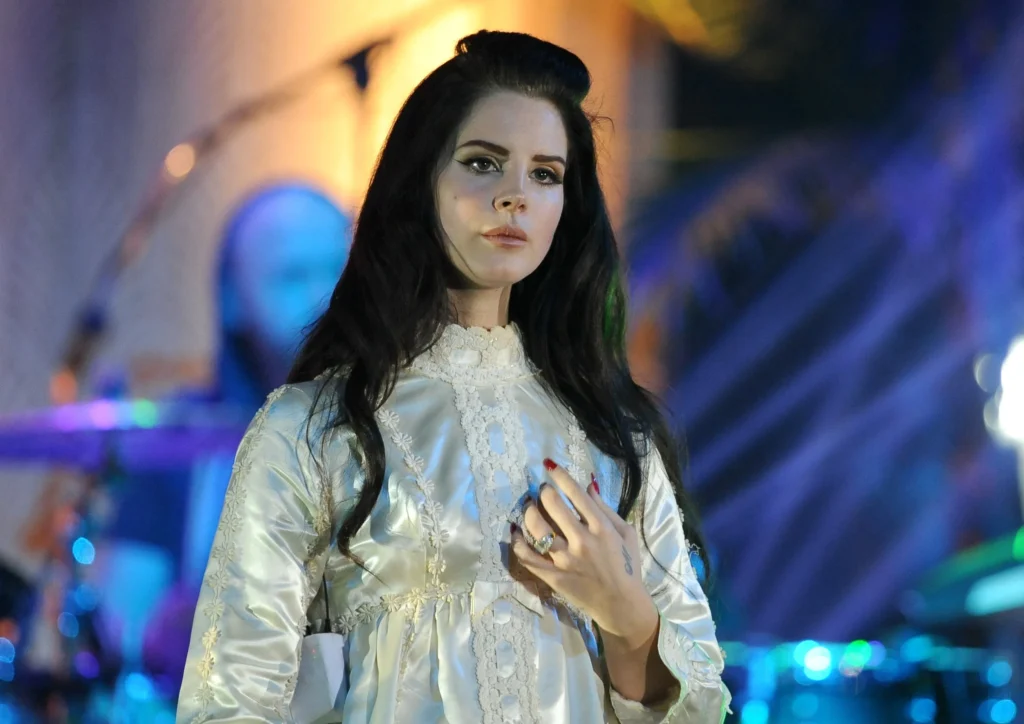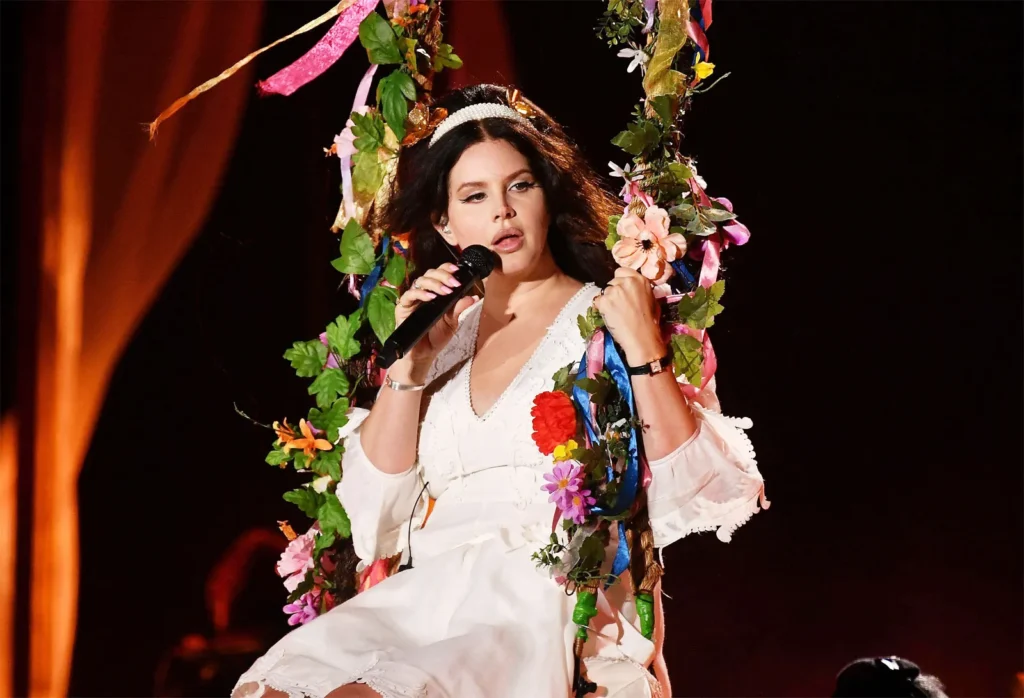“Feeling like I’ve done it all / Flying like a cannonball,” Lana Del Rey croons in her haunting ballad “Old Money,” capturing a sense of world-weariness and a yearning for a bygone era. This poignant line encapsulates the themes of nostalgia and disillusionment that permeate her music, drawing listeners into a dreamy, melancholic world where the past is both idolized and mourned.
Lana Del Rey’s lyrics are a rich tapestry woven from the threads of American pop culture and the profound influences of literary icons. Her work resonates with the glamour and tragedy of F. Scott Fitzgerald’s Jazz Age, and the dark, introspective edge of Sylvia Plath’s poetry. Through these influences, Del Rey crafts songs that evoke a sense of nostalgic longing while simultaneously critiquing the very ideals they celebrate. This article explores how the echoes of American cultural history and the haunting voices of literary giants shape the evocative lyrics of Lana Del Rey, creating a unique blend of wistful reverie and poignant disillusionment.
The Allure of American Pop Culture in Lana Del Rey’s Music

Lana Del Rey’s musical style is a distinctive fusion of cinematic dream pop, baroque pop, and indie rock, characterized by its lush orchestrations and Del Rey’s ethereal, melancholic vocals. Her thematic focus often revolves around the exploration of doomed romance, existential despair, and a wistful longing for the past. Del Rey’s music creates a hauntingly beautiful atmosphere, drawing listeners into a world where the lines between reality and fantasy blur, evoking a sense of timelessness and emotional depth.
Historical Context
Del Rey’s lyrics are steeped in the iconography of mid-20th-century America, frequently referencing the glamour of the 1950s and the rebellious spirit of the 1960s counterculture. The allure of Hollywood’s golden age, with its glittering starlets and tragic legends, intertwines with the darker, more turbulent narratives of the Beat Generation and the countercultural movements. This rich historical tapestry provides a backdrop against which Del Rey explores themes of love, loss, and the pursuit of the American Dream.
Lyric Analysis
In her song “Born to Die,” Del Rey channels the tragic allure of classic Hollywood with lyrics like “Feet don’t fail me now / Take me to the finish line.” The imagery conjures up visions of star-crossed lovers and the inevitable downfall that accompanies their pursuit of fame and fortune. This motif recurs in “National Anthem,” where she sings, “Money is the anthem of success,” critiquing the materialism and superficiality that underpin the American Dream.
Del Rey’s “Summertime Sadness” invokes the rebellious spirit of the 1960s, with its references to carefree love and the fleeting nature of youth. The line, “Kiss me hard before you go / Summertime sadness,” evokes a sense of impermanence and the bittersweet beauty of transient moments, reflecting the ethos of a generation that challenged societal norms and sought deeper meaning in life’s ephemeral pleasures.
In “Ride,” Del Rey captures the essence of the 1960s counterculture with vivid storytelling and nostalgic imagery. The lyrics, “I hear the birds on the summer breeze, I drive fast / I am alone in the night,” paint a picture of a restless soul searching for freedom and identity in a rapidly changing world. This song, like many others in her repertoire, uses historical references to evoke a sense of longing for a simpler, more authentic time, while also acknowledging the inherent disillusionment of such a quest.
F. Scott Fitzgerald’s Influence: The Glamour and Tragedy of the American Dream

Literary Background
F. Scott Fitzgerald, a towering figure in American literature, is best known for his novel The Great Gatsby. Published in 1925, The Great Gatsby explores the opulence and excess of the Jazz Age, set against the backdrop of the American Dream’s alluring yet illusory promise. The novel’s protagonist, Jay Gatsby, is emblematic of the era’s glamour and the pursuit of wealth, yet his story is underscored by a profound sense of disillusionment and unfulfilled desires. Fitzgerald’s poignant critique of the American Dream and his depiction of the fleeting nature of happiness and success continue to resonate deeply in contemporary culture.
Thematic Parallels
Lana Del Rey’s music often mirrors the themes found in Fitzgerald’s work, particularly the pursuit of the American Dream and the underlying disillusionment that accompanies it. Just as Gatsby’s lavish lifestyle and relentless quest for Daisy Buchanan symbolize the broader societal pursuit of wealth and status, Del Rey’s lyrics frequently explore the intoxicating allure of fame, fortune, and love, while simultaneously acknowledging their inherent emptiness and the inevitable disillusionment they bring.
Lyric Analysis
In “Young and Beautiful,” Del Rey echoes Fitzgerald’s exploration of fleeting beauty and the ephemeral nature of happiness. The lyrics, “Will you still love me when I’m no longer young and beautiful?” evoke the same sense of insecurity and inevitable decline that permeates The Great Gatsby. This question reflects the anxiety of maintaining one’s allure and relevance in a world obsessed with youth and superficial success, much like Gatsby’s own struggle to hold onto his idealized vision of Daisy and the life he dreams of.
“Off to the Races” delves into themes of excess and decadence reminiscent of Gatsby’s extravagant parties. The line, “My old man is a bad man but / I can’t deny the way he holds my hand,” captures a relationship marked by glamour and danger, mirroring the allure and peril of Gatsby’s high-society world. Del Rey’s portrayal of a life of luxury, laced with underlying darkness, speaks to the same duality found in Fitzgerald’s critique of the American Dream.
In “National Anthem,” Del Rey directly references the myth of the American Dream, singing, “Money is the anthem of success / So put on mascara, and your party dress.” This celebration of wealth and status, paired with a critical undercurrent, reflects Fitzgerald’s portrayal of the American Dream as both a seductive and ultimately hollow pursuit. Del Rey’s narrative voice, much like Fitzgerald’s, underscores the disillusionment that lies beneath the surface of glamour and success.
Sylvia Plath’s Influence: The Dark Edge of Romance and Self-Destruction

Literary Background
Sylvia Plath, an iconic figure in 20th-century literature, is renowned for her confessional style of writing that delves deeply into themes of mental anguish, self-destruction, and the intricacies of female identity. Her semi-autobiographical novel The Bell Jar and her collections of poetry, particularly Ariel, reveal a raw, introspective exploration of her struggles with depression and the societal pressures faced by women. Plath’s work is marked by its stark honesty and haunting beauty, capturing the tumultuous inner world of her protagonists and herself.
Thematic Parallels
Lana Del Rey’s music frequently mirrors Plath’s exploration of dark, introspective themes. Del Rey delves into the depths of emotional turmoil, self-destructive tendencies, and the complex nature of femininity, much like Plath’s literary work. Both artists use their respective mediums to articulate a sense of existential despair and romantic fatalism, creating a profound connection with their audiences through shared experiences of pain and vulnerability.
Lyric Analysis
In “Born to Die,” Del Rey captures the essence of Plath’s existential despair with lines like, “Sometimes love is not enough and the road gets tough.” This acknowledgment of the fragility and fleeting nature of happiness reflects Plath’s themes of mental anguish and the inevitability of suffering. The song’s melancholic tone and fatalistic outlook echo the dark introspection found in Plath’s poetry.
“Ultraviolence” delves into the darker aspects of romantic relationships, resonating with Plath’s exploration of self-destructive love. The lyrics, “He used to call me DN / That stood for deadly nightshade,” evoke the image of a toxic relationship, where love and pain are inextricably linked. This portrayal of destructive romance mirrors Plath’s own tumultuous relationships and her portrayal of love as a double-edged sword in her work.
In “Summertime Sadness,” Del Rey taps into Plath’s themes of melancholy and the transient nature of joy. The line, “I think I’ll miss you forever / Like the stars miss the sun in the morning sky,” reflects a sense of enduring loss and the longing for something unattainable. This sense of perpetual sadness and yearning is a central theme in Plath’s poetry, where moments of beauty are often overshadowed by an underlying sense of despair.
Del Rey’s “Carmen” offers a poignant exploration of the pressures of female identity and the descent into self-destruction, themes that are central to Plath’s work. The lyrics, “The boys, the girls, they all like Carmen / She gives them butterflies, bats her cartoon eyes,” depict a woman who is admired yet deeply troubled, masking her pain behind a facade of allure. This mirrors Plath’s exploration of the expectations placed on women and the internal struggles they face in trying to meet those societal standards.
The Interplay of Nostalgia and Disillusionment in Lana Del Rey’s Lyrics

Concept of Nostalgia
Lana Del Rey’s music is often suffused with a sense of nostalgia that goes beyond mere longing for the past. Instead, she uses nostalgia as a powerful tool to critique contemporary society. Del Rey’s lyrics frequently evoke bygone eras, particularly the 1950s and 1960s, romanticizing their cultural icons and aesthetic values. However, beneath this veneer of longing lies a deeper commentary on the disillusionment and emptiness of the present. By juxtaposing the idealized past with the harsh realities of modern life, Del Rey underscores the disconnect between the glittering promises of the American Dream and its often disappointing reality.
Sense of Disillusionment
Disillusionment is a recurring theme in Del Rey’s music, serving as a counterpoint to her nostalgic references. Her lyrics often reflect a sense of betrayal and discontent, highlighting the failures of the American Dream and the darker aspects of romanticized eras. Through her music, Del Rey critiques the myth of perpetual happiness and success, exposing the emotional void and societal pressures that lie beneath the surface of idealized historical periods. This sense of disillusionment adds depth to her nostalgic imagery, creating a rich, multifaceted emotional landscape.
Lyric Analysis
In “Video Games,” Del Rey intertwines nostalgia and disillusionment to create a complex portrayal of love and loss. The lyrics, “It’s you, it’s you, it’s all for you / Everything I do,” evoke a sense of devotion and yearning for a simpler time. However, the underlying melancholy in her voice and the reference to escapism through video games reveal a deeper sense of dissatisfaction with contemporary life and relationships. This blend of nostalgic longing and present-day disillusionment captures the tension between idealized love and the reality of unfulfilled desires.
“Blue Jeans” is another example where Del Rey’s nostalgia for the past is tinged with disillusionment. The lyrics, “I will love you till the end of time / I would wait a million years,” evoke the timeless, unwavering devotion characteristic of classic romance. Yet, the story’s outcome—marked by abandonment and heartbreak—reflects the disillusionment inherent in clinging to such idealized notions of love. The song’s narrative arc mirrors the fleeting nature of happiness and the inevitability of disillusionment in the pursuit of idealized dreams.
In “Ride,” Del Rey explores themes of freedom and escape, using nostalgic imagery to critique contemporary society’s constraints. The lyrics, “I hear the birds on the summer breeze, I drive fast / I am alone in the night,” evoke the sense of youthful rebellion and the search for meaning. However, the recurring refrain, “I’m tired of feeling like I’m fucking crazy,” reveals the disillusionment and mental anguish that accompany this quest for freedom. The juxtaposition of nostalgic imagery with a raw depiction of emotional turmoil highlights the complexities of seeking authenticity and fulfillment in a world that often falls short of its promises.
Closing Thoughts

Lana Del Rey’s music is profoundly shaped by the influences of American pop culture and literary icons such as F. Scott Fitzgerald and Sylvia Plath. Through her lyrics, Del Rey evokes the glamour and tragedy of the American Dream, reminiscent of Fitzgerald’s The Great Gatsby, while also channeling the dark introspection and complex femininity found in Plath’s works. Her use of nostalgia as a lens to critique contemporary society, paired with a pervasive sense of disillusionment, creates a rich, multifaceted emotional landscape that resonates deeply with listeners. Songs like “Video Games,” “Born to Die,” and “Ride” exemplify how Del Rey masterfully weaves these influences into her music, crafting narratives that are both hauntingly beautiful and poignantly critical.
As we continue to navigate the complexities of the 21st century, Lana Del Rey’s exploration of nostalgia and disillusionment remains strikingly relevant. Her music challenges us to reflect on the myths we hold dear and the realities we face, inviting us to consider: In a world where the lines between fantasy and reality are increasingly blurred, what does it mean to pursue the American Dream? And how do the echoes of the past shape our understanding of the present? These enduring questions ensure that Del Rey’s music will continue to resonate, offering solace and introspection to those who listen.
